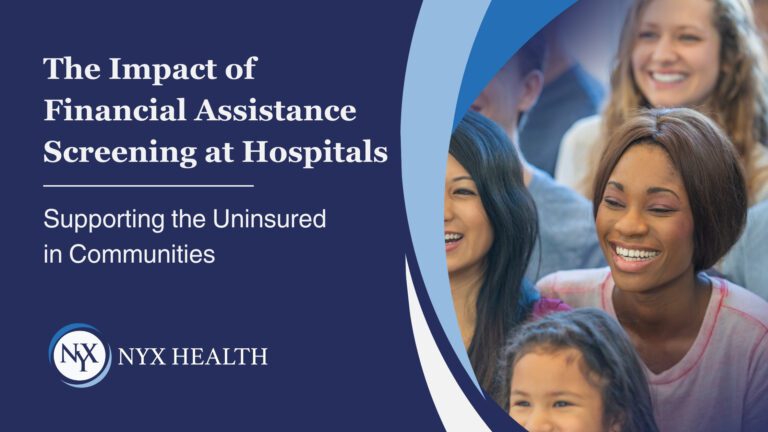The Impact of Financial Assistance Screening at Hospitals

Supporting the Uninsured in Communities
Hospitals, as pillars of community health, face a balancing act between financial sustainability and providing essential care to uninsured patients. The dual responsibilities of financial viability and community care can be difficult to manage. Utilizing a charity care program and screening all patients for eligibility to third-party programs, like Medicaid, are crucial in hospitals’ efforts to support the uninsured in their communities.
Medicaid
Medicaid and other third-party programs offer hospitals some compensation for the services provided to eligible low-income patients. Unfortunately, reimbursement rates vary by state and often fall short of covering the full cost of care. Navigating Medicaid reimbursements requires proven revenue cycle planning to mitigate potential losses while providing essential healthcare services. Medicaid payments remain a crucial lifeline for hospitals in economically disadvantaged areas, ensuring continued access to care for uninsured populations.
Charity Care
Charity care services act as a safety net for those who lack health insurance coverage and cannot afford to pay for medical services out-of-pocket. Hospitals across the country allocate a significant portion of their resources to provide these services, often at reduced cost or no cost to the patient.
From a financial perspective, charity care represents a substantial uncompensated expense for hospitals. These costs impact the hospitals overall revenue cycle by increasing operational expenses without another revenue stream to offset the increase. Despite this financial strain, hospitals recognize the need for charity care in promoting public health and continual care.
Screening Uninsured Patients
The importance of screening your uninsured patients is higher than ever. By proactively screening uninsured patients for third-party assistance, hospitals can mitigate these financial burdens. Third-party assistance programs such as Medicaid, state-funded indigent care programs, and hospital charity care, offer avenues for reimbursement or subsidy of medical expenses incurred by uninsured patients. This helps hospitals recover some of the costs associated with providing uncompensated care, thus improving their financial viability and sustainability.
Promoting Preventative Care
Early intervention and preventative care are pivotal in maintaining overall health and reducing healthcare costs. When uninsured patients have access to healthcare, they are more likely to seek preventative screenings, vaccinations, and routine check-ups. This proactive approach not only improves individual health but also contributes to the overall long-term health of the community and the hospital. By addressing health concerns early on, hospital can prevent the escalation of medical issues into costly emergencies.
As we navigate the evolving landscape of healthcare, recognizing the vital role of screening uninsured patients, utilizing charity care, and engaging third-party assistance is essential. It’s not just a financial strategy for hospitals – it is a commitment to upholding the principles of equity, compassion, and patient-centered care. By facilitating access to essential healthcare services, hospitals not only support their own financial sustainability but also fulfill their mission to serve the community.
NYX Health is an eligibility and enrollment company specializing in comprehensive eligibility and enrollment services that improve the revenue of healthcare facilities while assisting patients with medical bills. We staff patient advocates at hospitals to screen uninsured patients at the time of service. Our follow-up off-site team ensures all applications are followed through. Learn more at https://nyxhealth.com
